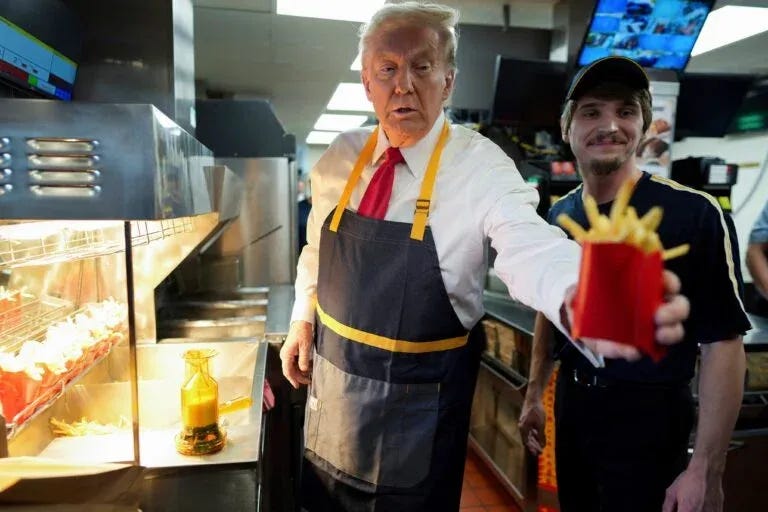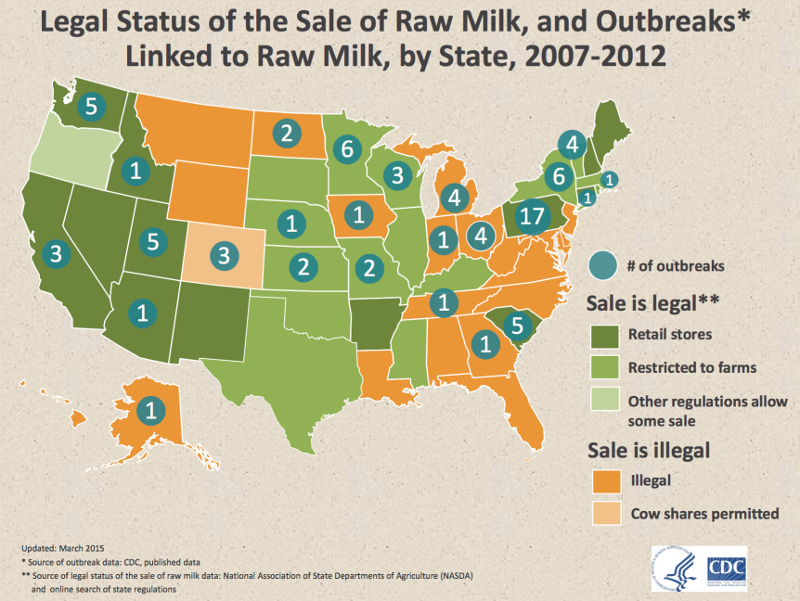When my social media feed exploded over Donald Trump’s brief and well-scripted visit to McDonald’s in Feasterville, Pennsylvania, on Sunday, just north of Philadelphia in politically competitive lower Bucks County, my political thoughts immediately turned to Robert F. Kennedy Jr.
Most of the clips of Trump from that very brief event included him working the fryer inside the McDonald’s before moving to the drive-through window to interact with pre-chosen and vetted customers. Like it or not, it was a political tour de force. The visit was prompted by Vice President Kamala Harris’s unsubstantiated claim to have once, briefly, worked at a McDonald’s (her formative years were in Berkley, California; high school in Montreal, Quebec; and college at Howard University in Washington, DC).

Kennedy, nephew of President John F. Kennedy, son of the late US Senator and former Attorney General Robert F. Kennedy Jr., and the former Democrat-turned-Independent presidential candidate who dropped out and endorsed Trump, has made it his mission to “Make America Healthy Again.” As a food industry veteran, I wondered how Kennedy, a vocal critic of government nutrition advice, policies, and American dietary habits in general, would respond. After all, Trump’s affinity for fast food is not exactly consistent with that.
Kennedy did so with a post on X late Monday evening.
Fast Food is a part of American culture. But that doesn’t mean it has to be unhealthy, and that we can’t make better choices. Did you know that McDonald’s used to use beef tallow to make their fries from 1940 until phasing it out in favor of seed oils in 1990? This switch was made because saturated animal fats were thought to be unhealthy, but we have since discovered that seed oils are one of the driving causes of the obesity epidemic. Interestingly enough, this began to drastically rise around the same time fast food restaurants switched from beef tallow to seed oils in their fryers. People who enjoy a burger with fries on a night out aren’t to blame, and Americans should have every right to eat out at a restaurant without being unknowingly poisoned by heavily subsidized seed oils. It’s time to Make Frying Oil Tallow Again.
Oilseed representatives, especially the National Oilseed Producers Association, haven’t spoken up yet. They’d better ramp up on the nutrition front. I don’t know how oilseeds contribute to the obesity crisis other than the sheer volume of rising consumption (oils are caloric, but no more than beef fat). From sunflower to canola and soybeans, they’re all not the same. “Vegetable oil breaks down into the obesogenic toxin HNE (4-Hydroxynonenal), which appears to be a cause of obesity,” says the Zero Acre Blog, which is very anti-vegetable oil. I didn’t delve into their evidence. I use very little, but I know it’s used in many processed foods. Oilseeds have advantages over other oils in the cooking process.
I can’t deny that oilseeds are linked to obesity; it’s worth studying. A Trump-led Food and Drug Administration might ramp up some studies here. Harris hasn’t said anything about food issues other than expressing joy for grilling and Doritos, which are processed with vegetable oils.

Nutrition activists have outsized influence over the media and food makers, whom they whipsaw with often contradictory advice and dubious science. Food makers like McDonalds and most major packaged food companies are very sensitive to criticism of their products and employ scores of food scientists to find ways of making their products healthier and more marketable. And there’s an army of anti-corporate nutrition and food critics who make a nice living going after them, led by the Center for Science in the Public Interest (CSPI), and more recently, sensationalist social media influence Vani Hari, known as the “The Food Babe.” She’s a 2001 computer science graduate from the University of North Carolina in Charlotte and worked as a management consultant for Accenture. She decided to pursue a food activist career after contracting appendicitis in her 20s.
Nutrition expertise? You’ll need to borrow her magnifying glass to find that on her resume, and good luck.
It was about 58 years ago that a manufacturing executive from Omaha, Nebraska, the late Phil Sokolof, suffered a heart attack in his 40s. A Time Magazine profile from 1991 tells his story.
Luckily for Sokolof, who was addicted to ice cream, hamburgers, hot dogs and “anything greasy,” his doctor was one of the early believers in the association of fatty foods with high cholesterol and heart disease. He warned Sokolof that his cholesterol reading, at 300, was dangerously high and prescribed a low-fat diet. Within a few months, Sokolof’s cholesterol level had dropped to 190 (it is now 150). During his recovery, he pestered his doctor with questions about cholesterol, plaque and other heart-related topics. “Phil,” he recalls the doctor saying, “I can’t make you a cardiologist.” But Sokolof pressed on. “Now I consider myself an amateur cardiologist,” he says, “and I know a lot more about cholesterol than some of them do.”
Everybody’s an expert, it seems, especially in the nutrition space. Just ask them.
Sokolof started the National Heart Savers Association (with a staff of three, including himself) and wrote a book, “Add Years to Your Life.” In 1990, after a massive public campaign and considerable media and political pressure, McDonald’s and other quick-serve restaurants caved and switched from beef tallow, high in saturated fat, to vegetable oils. McDonald’s has been refining its cooking formula ever since, most recently eliminating artificial, partially-hydrogenated transfats, which have proven even less healthy than saturated fat and are mostly now out of the food supply.
And now, Kennedy, a trial lawyer and one of America’s leading food activists, is pushing to reinstate beef fat in French fries.
Vegetarians, call your offices.
You’ll forgive food makers for feeling whipsawed by the never-ending and contradictory claims of food activists. No one seems to call the stuff they’re peddling “disinformation” or “misinformation,” although much of it is. Much of their rhetoric is infused with fear-mongering. And I haven’t even gotten into “organic” foods yet.
I understand their popularity and why the media gives them so much attention, especially those morning TV shows catering to younger stay-at-home moms and caregivers. They use explicit language and help the media get their headlines. And never mind the cavalcade of fad diets and now pharmaceuticals all designed to make us healthier, even as America is awash in obesity and chronic disease (Kennedy is right about that).
If you really want to get on the news shows and go viral on social media, suggest that something causes cancer. Even if the proof is practically non-existent. Take the acrylamide scare of a decade ago, which targeted coffee and toasted bakery products. It triggered warning labels and signs in California after animals were fed very high doses of the stuff, far higher than humans consume, in “studies.” There’s never been a confirmed case of human cancer from acrylamide consumption. Artificial food colors are another bugaboo for many, and a few have recently proven problematic. Some, like Yellow numbers 5 and 6, are derived from petroleum products. Most food makers strive for natural colors and flavors.
Remember what you were taught in your eighth-grade science class: the dose makes the poison. Most foods can be enjoyed in moderation.
I’ve long noted that very few of the activists will discuss the health impacts of alcohol consumption. They’ll happily demand nutrition facts labels and traffic-light labels on the front of food packages, but don’t look for one on a bottle of bourbon or your favorite wine or beer (a separate federal agency also regulates them). There is no word from these same activists about the dangers of raw milk consumption. Still, they’re happy to discuss the dangerous “fire retardant,” brominated vegetable oil (water is also a “fire retardant”) used safely in many flavored beverages. Don’t get me started. The FDA revoked its food additive regulation this summer after new studies raised doubts about its safety. It’s been part of the food supply for a century.
Sokolof died on Tax Day, 2004, at age 82. I wonder what he would think of Kennedy’s “Make America Healthy Again” idea of reintroducing an ingredient he devoted his second career to eliminating from the food supply. Meanwhile, most medical schools don’t teach more than one course on nutrition, and it’s practically absent from our schools. Most students get their best advice from athletic coaches, as my two sons did. But not every student plays a sport.
Don’t get me started on school and other government feeding programs and the waste they engender. Opportunistic lawyers have contributed plenty of misery to the discourse, along with a cavalcade of junk science the media never bothers to challenge.
Let’s face it. Our federal government’s food and nutrition system is a mess, and constantly evolving government advice since the late 1970s has failed to lead us to becoming a healthier nation. “Program crops” like wheat, soybeans, and corn are heavily subsidized with your tax dollars, and farmers who want to shift from them to vegetable production face regulatory barriers. The no-sugar craze has replaced the low-fat craze as one of the fads du jour. And attacks on so-called “ultra-processed foods” are in high gear, but it’s unclear what qualifies. Many yogurts qualify, for example, along with protein bars and whole-grain snacks.
We could learn some things from countries with more nutritious food systems and habits, including parts of Europe and Asia. Still, even they’re experiencing rising cases of obesity and chronic disease. Sodium consumption is very high among many Asian cultures, a big no-no at the Food and Drug Administration.

Another reality is that the science of food and nutrition is evolving. In the late 1880s, “love apples”—tomatoes—were considered poisonous by my Missouri ancestors. Those little pink packets of Sweet ‘n Low artificial sweetener carried a cancer warning label for decades until someone realized there was zero evidence for it. Yesterday’s low-fat fads have been replaced by low-carb, high-protein Keto and carnivore diet plans that seem to work for many people, and saturated fat concerns that dominated the scene 40 years ago seem to be fading.
My mom tells me that when I was born, her pediatrician advised her not to breastfeed but to give me sweetened condensed milk, a cup of which today equals 982 calories, 17 grams of saturated fat, and 166 grams of total carbs. Somehow, I survived the experience. I also drank water from a garden hose when I was a kid and rode around on bicycles without a helmet, so there’s that. My dad’s first cars also didn’t have seat belts. And what were car seats like for kids back then?
Our bodies all differ and respond differently to our environments and dietary habits. Some people can smoke for a lifetime and never get cancer from it. And what’s with the massive increase in gluten sensitivity, which was unheard of when I was growing up? Maybe the answer is individual tests to find out what our bodies need. There’s an industry for that, too.
If Trump wins and is serious about keeping his deal with Kennedy to make America healthier again, we may be in for exciting times. I welcome it, but Kennedy, Dr. Casey Means, and others in his camp likely to win leading roles in a new Administration will have their hands full with conflicting experts, media confusion, pseudo-science, and contradictory agendas and studies. I wish them well. Meanwhile, cast a skeptical look on anyone who claims to have “all the answers” to our nutrition and health challenges.
One last observation about Trump’s visit to McDonald’s. Did anyone else find it weird that Trump was attacked for making “unsubstantiated” claims that Harris never worked at a McDonald’s? I thought asking someone to “prove a negative” was illogical.
The burden of proof falls on the one making the assertion. Most of us learned that in high school speech and debate classes. I also learned that in journalism class in college, but reporters aren’t taught that anymore.
Funny story. I got into a spat on X/Twitter with someone who defended the absence of evidence of Harris’s McDonald’s employment with the old canard, a maxim from cosmologist Martin Rees, "the absence of evidence is not evidence of absence." That’s what you might call argumentum ad ignorantium, or an appeal to ignorance. I quickly realized I was punching down and moved along. The “appeal to ignorance” describes a lot of rhetoric, especially media coverage being spewed this election. X brims with it but this is free speech. That’s okay.











really important subject and history-food, additives, and cooking methods
Great read (as usual)! You and RFKJ are correct about food being a cause of conditions. My daughter is an Emotional Support teacher and under our previous governor, they are providing breakfast at the school (ironically in one of the wealthier schools in Bucks County) which consists of Lucky Charms and Rice Krispie Treats. And they wonder why there are behavioral issues.